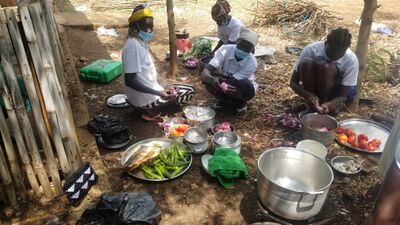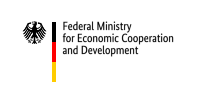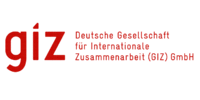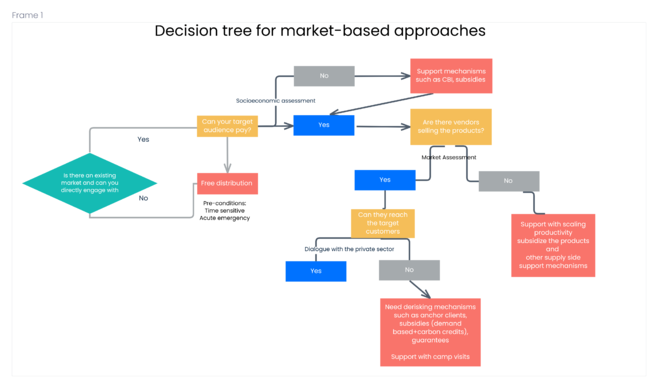Difference between revisions of "Webinar on Cooking Energy in Displacement Settings"
***** (***** | *****) m |
***** (***** | *****) m Tag: 2017 source edit |
||
| (133 intermediate revisions by 4 users not shown) | |||
| Line 1: | Line 1: | ||
| − | {| | + | <div class="portal-esds"> <!-- Defines the color of headlines, link, etc. ) --> |
| − | + | {{ESDS:Link to Articles}} | |
| − | | | + | |
| − | + | =Webinar Series on Market-based Approaches for Promoting Clean Cooking Solutions in Displacement Settings= | |
| + | [[File:Cooking Energy in Humanitarian Context 3.jpg|400px|right|link=]] | ||
| + | Traditionally, humanitarian energy responses have focused on a free distribution approach for meeting the energy needs of the displacement population. However, in recent years, other energy delivery models such as the market-based approach has been gaining traction. Markets are usually the principal means to access goods, services and income in any context and are very complex with multiple stakeholders involved in different stages of the value chain. In displacement settings, market-based approach is used to capitalize the private sector to meet the energy needs of the displaced population. | ||
| + | |||
| + | This series of two webinars aims to provide a holistic overview of market-based approaches for promoting clean cooking solutions in displacement settings. While the first webinar will set the scene by discussing the pre-conditions for a market-based approach, the second webinar will dive deeper and look at support mechanisms needed for a market to flourish. | ||
| + | |||
| + | This webinar series is organized jointly by [[ESDS Resource Page|GIZ]] [[Energy Solutions for Displacement Settings|Energy Solutions for Displacement Settings program]], [https://www.humanitarianenergy.org/ GPA Coordination Unit] and [https://www.unhcr.org/ United Nations High Commissioner for Refugees (UNHCR)] to promote learning and knowledge exchange among humanitarian energy practitioners to advance the clean cooking sector. | ||
| + | |||
| + | <div id="tabs"> | ||
| + | *[[#Webinar 1|Demand and supply side support mechanisms]] | ||
| + | *[[#Webinar 2|Understanding market-based approach]] | ||
| + | *[[#Webinar 3|Past webinars on clean cooking]] | ||
| + | |||
| + | <div id="Webinar 1"> | ||
| + | ==Demand and supply side support mechanisms for a market-based approach== | ||
| + | |||
| + | {{#widget:YouTube|id=ysszGwpDa6A|height=400|width=700}} | ||
| + | |||
| + | === Webinar Presentation === | ||
| + | *[[:File:Webinar on demand and supply side mechanisms.pdf|Download the presentation]] | ||
| + | |||
| + | == Resources == | ||
| + | * RBF report: https://cleancooking.org/wp-content/uploads/2022/10/CCA-Clean-Cooking-RBFs-Report-2022.pdf | ||
| + | </div> | ||
| + | <div id="Webinar 2"> | ||
| + | ==Understanding market-based approaches for promoting clean cooking solutions in displacement settings== | ||
| + | |||
| + | {{#widget:YouTube|id=jbbPv1rsYM0|height=400|width=700}} | ||
| + | |||
| + | This webinar, the first in the series, will introduce market-based approaches for delivery of clean cooking solutions in displacement settings. It aims to provide a common understanding of the market-based approach, highlighting pitfalls as well as opportunities to scale up. Presentations from Chatham House, GIZ, and UNHCR will introduce the topic, showcase a case study from Uganda and provide insights into Cash-Based Interventions respectively. | ||
| + | |||
| + | *[https://energypedia.info/images/3/35/Webinar_on_understanding_market-based_approaches_for_promoting_clean_cooking_solutions_in_displacement_settings.pdf Download the presentations] | ||
| + | |||
| + | |||
| + | ===Resources=== | ||
| + | *[[Energy Solutions for Displacement Settings|GIZ Energy Solutions for Displacement Settings Programme]] | ||
| + | **[[End-user finance in payment Systems in displacement settings]] | ||
| + | **[[Harnessing Humanitarian Finance Schemes for Energy Access]] | ||
| + | **[[Potentials of Biomass Cooking Fuel Production in Displacement Settings]] | ||
| + | **[[ESDS_Resource_Page|List of resources from GIZ ESDS]] | ||
| + | *[https://www.youtube.com/watch?v=wNrdzcpzufM GPA Webinar on Market-Based Approaches to Energy Access in Humanitarian Contexts] | ||
| + | *[[:File:Toolbox for Energy Assessments in Refugee Settlements and Host Communities.pdf|Toolbox for Energy Assessments in Refugee Settlements and Host Communities]]: This toolkit provides a list of questionnaires and guidelines for conducting energy needs assessments for cooking energy as well as other energy needs. | ||
| + | *[https://www.chathamhouse.org/sites/default/files/publications/research/2019-03-25-MEIWhitehouse.pdf MEI (2019).Adopting a Market-based Approach to Boost Energy Access in Displaced Contexts] | ||
| + | *UNHCR Cash Policy 2022-2026: <nowiki>https://www.unhcr.org/61fbc91a4</nowiki> | ||
| + | *Main Outcomes of UNHCR cash assistance 2021: https://intranet.unhcr.org/content/dam/unhcr/intranet/protection-operations/cash-based-interventions/documents/english/post-distribution-monitoring/english/CBI%20PDM%202021%20summary%20report.pdf | ||
| + | *Multi-sectorial market assessment toolkit: <nowiki>https://www.unhcr.org/5fd8cfb64.pdf</nowiki> | ||
| + | *A pathway to financial inclusion: <nowiki>https://www.unhcr.org/5fdcd8474</nowiki> | ||
| + | [[File:Decision tree for market-based approaches.png|658x658px]] | ||
| + | </div> | ||
| + | <div id="Webinar 3"> | ||
| + | Millions of refugees and other displaced people, whether internally displaced or asylum seekers, still cook with polluting and inadequate cooking fuels and technologies today. Between July and November 2021, [[ESDS Resource Page|GIZ ESDS]], EnDev, GPA Coordination Unit, UNHCR, Clean Cooking Alliance and Modern Energy Cooking Services programme (MECS) organised a series of three webinars on [[Webinar on Cooking Energy in Displacement Settings|Cooking energy in displacement settings]]. Over 300 attendees from across the humanitarian sector, academia and other research organisations, development partners, the private sector and the donor community participated in sessions, which covered: an overview of the different actors in the humanitarian cooking energy space ([[Webinar on Cooking Energy in Displacement Settings#Webinar%201|webinar 1]]); the different technologies that have been deployed in displacement settings in the past and the new trends that are currently emerging ([[Webinar on Cooking Energy in Displacement Settings#Webinar%202|webinar 2]]); and the range of delivery models for energy access solutions for cooking that are the most prevalent in the sector, depending on the context, the location, the existing needs and capacities of the households, businesses and institutions ([[Webinar on Cooking Energy in Displacement Settings#Webinar%203|webinar 3]]). The webinar series also allowed for the identification of some of the key challenges and opportunities for the facilitation of clean cooking transitions in displacement settings. | ||
| + | |||
| + | There have been several dispersed attempts to address energy needs of displaced populations. While poor energy access has major implications on the local environment, wellbeing, and social cohesion in displacement areas, it is not systematically part of the humanitarian response. There has, however, been an increased interest from the wider development community and humanitarian organisations to combine efforts to fill in the energy access gaps in displacement settings. Cooking energy in humanitarian settings is particularly challenging as food preparation is a basic need and for many displaced people firewood is often the only available fuel option. As humanitarian emergencies often turn from sudden onset to protracted crisis, new ways of working and securing energy services for the displaced are needed, with sustainability issues addressed from the start. This is not only critical to ensure lasting impact, but it also aligns with the principles laid out in the [https://www.unhcr.org/the-global-compact-on-refugees.html Global Compact on Refugees] that promotes sustainable solutions and international collaboration. | ||
| + | <div class="mw-collapsible mw-collapsed"> | ||
| + | There is also a need to build off from the immediate provision of cookstoves to approaches which look at cooking systems more holistically. By definition, a cooking system includes: users, who decide when and how to use the cookstoves; cooking fuel(s); and stove(s), designed to fit the available fuel (whether immediately or upon procurement, ideally without the need to resort to international imports) and the food being cooked. With that definition in mind, the webinar series intended to critically assess how energy for cooking is currently provided and how forging partnerships between different stakeholders from both the humanitarian and the development sectors can help design better energy access models while at the same time speeding up efforts. It highlighted that there is no ‘one fits all’ solution and that local resources and expertise as well as the active involvement of the users are key to finding a solution for meeting the clean cooking needs of displaced populations. It also demonstrated the necessity for a diverse range of cooking energy solutions and delivery models to be scaled up quickly if that goal is to be reached. | ||
| − | + | Several presenters also stressed the need for better partnerships and more meaningful collaborations to leverage existing activities and initiatives across the humanitarian and development energy sectors. Involving and supporting the private sector to become part of a self-sustaining economy around cooking energy access seems to be key, even though the cooking energy sector in particular in low-income contexts is not widely considered to be profit-making. Given that energy access in displacement settings tends to sit on the peripheries of national energy planning and implementation, and that there is no comprehensive energy access policy framework for displacement settings, more efforts to bridge the humanitarian and development divide have been called for. | |
| − | |||
| − | |||
| − | + | The planned outputs, which includes an overview of available technologies, follow-up events for different actors and deep-dives into most promising cooking energy systems will offer guidance for those already working to address the challenge of energy access in displacement settings, and to those who are interested in joining in future efforts. | |
| + | </div> | ||
| − | = | + | ===Webinar 1: Landscaping=== |
| − | |||
| + | {{#widget:YouTube|id=BesNBO6wsnc|height=400|width=700}} | ||
| − | This webinar | + | This webinar aims to provide an overview of the stakeholder landscape of the humanitarian cooking sector and to improve mutual understanding as a base for successful cooperation. It will shed light on their approaches and what are their advocating for; success factors as well as common challenges in existing cooking energy interventions. |
| − | + | *'''[[Webinar on Cooking Energy in Displacement Settings ( Q and A)|All Q&A during the webinar are document here.]]''' | |
| + | *'''[[Webinar on Cooking Energy in Displacement Setting - Summary|Key takeaways from the webinar]]''' | ||
| + | *[https://energypedia.info/images/1/17/PROSPERS_Presentation_Webinar_Cooking_Energy_in_Displacement_Settings.pdf African Clean Energy PROSPERS Presentation] | ||
| − | |||
| + | ===Webinar 2: All Relevant Cooking Systems in a Word=== | ||
| − | + | {{#widget:YouTube|id=YJ_vUJX23wE|height=400|width=700}} | |
| + | *'''The opinions shared in this webinar are those of the presenters. For questions, please contact the presenters directly.''' | ||
| − | + | This webinar, second in the series provides a brief snapshot of relevant cooking energy systems such as processed biomass, firewood, e-cooking, LPG, ethanol and biogas. The first part of the webinar will feature short presentations highlighting the applicability, availability, affordability, health and safety as well as environmental aspects of each cooking system. In the second part, the audience can dive deeper into break-out sessions and engage directly with the presenters. This webinar will feature six break-out sessions on the above-mentioned cooking systems. | |
| + | *[[:File:Cooking Energy in Displacement Settings Webinar - presentation.pdf|Clean cooking technology/fuel presentation]] | ||
| + | *[[:File:Cooking Energy in Displacement Settings - All Relevant Cooking Systems in a Word - Breakout sessions content.pdf|Summary of breakout sessions]] | ||
| − | |||
| − | |||
| − | |||
| − | |||
| − | |||
| − | == | + | ===Webinar 3: Delivery Models=== |
| − | { | + | {{#widget:YouTube|id=XV4Hrx3YaG4|height=400|width=700}} |
| − | | | ||
| − | |||
| − | |||
| − | |||
| − | | | ||
| − | |||
| − | |||
| − | |||
| − | |||
| − | |||
| − | |||
| − | |||
| − | |||
| − | |||
| − | |||
| − | |||
| − | |||
| − | + | This webinar outlines the different delivery models for providing access to clean cooking solutions in the humanitarian context. The first half features an overview presentation on three main delivery models i.e Free distribution, Cash-based transfer and Private sector business models. The second half then showcases examples of the different delivery models and how they can be combined in humanitarian responses. This webinar is organised jointly by GIZ (ESDS and EnDev), GPA and MECS and is part of a webinar series on Cooking Energy in Displacement Settings. | |
| − | |||
| − | |||
| − | |||
| − | |||
| − | |||
| − | |||
| − | |||
| − | |||
| − | |||
| − | + | *[[:File:Webinar 3 Delivery Models Presentation.pdf|Overview presentation on delivery models]] | |
| + | *[[:File:Delivery Models for Cooking Energy in Displacement Settings.pdf|Delivery Models for Cooking Energy in Displacement Settings]] | ||
| + | *[[:File:Building Sustainable Energy Markets and Delivery Model in Refugee Settings in Uganda.pdf|Building Sustainable Energy Markets and Delivery Model in Refugee Settings in Uganda]] | ||
| + | *'''[[Webinar3 on Cooking Energy in Displacement Settings ( Q and A)|Q&A for this webinar are documented here.]]''' | ||
| + | *[https://endev.info/clean-cooking-how-to-promote-behavioural-change-among-households-and-communities/ Clean Cooking: How to promote behavioural change among households and communities] | ||
| + | *[https://www.mdpi.com/1996-1073/14/14/4176/htm Funding and Delivery Models for Modern Energy Cooking Services in Displacement Settings: A Review] | ||
| + | *[https://snv.org/assets/explore/download/ccak_biomass_institutional_cookstoves_and_fuels_infographics_compressed_0.pdf Promoting Market Based Energy Access for Cooking and Lighting in Kakuma Refugee Camp] | ||
| + | </div> <!-- End Webinar 3 Tab --> | ||
| + | </div> <!-- End #tabs --> | ||
| − | == | + | ===Financed by=== |
[[File:Logo BMZ 2017 Web en.gif|300px|alt=BMZ Logo.png|link=]] | [[File:Logo BMZ 2017 Web en.gif|300px|alt=BMZ Logo.png|link=]] | ||
| − | == | + | ===Organised by=== |
{| style="width: 459px" cellpadding="2" | {| style="width: 459px" cellpadding="2" | ||
|- | |- | ||
| − | | style="width: 244px" | [[File:Logo GIZ.gif|left|200px|alt=Gizlogo-unternehmen-de-rgb copy.gif|link=]] | + | | style="width: 244px" |[[File:Logo GIZ.gif|left|200px|alt=Gizlogo-unternehmen-de-rgb copy.gif|link=]] |
| − | | style="width: 196px" | [[File:UNHCR Logo.png|left|180px|alt=UNHCR Logo.png|link=]] | + | | style="width: 196px" |[[File:UNHCR Logo.png|left|180px|alt=UNHCR Logo.png|link=]] |
|} | |} | ||
| − | == | + | ===Co-organised by=== |
{| style="width:100%" cellpadding="10" | {| style="width:100%" cellpadding="10" | ||
|- | |- | ||
| − | | [[File:EnDev-Logo NEW.PNG|120px|alt=EnDev logo|link=]] | + | |[[File:EnDev-Logo NEW.PNG|120px|alt=EnDev logo|link=]] |
| − | | [[File:Logo UNITAR-GPA 2.png|150px|alt=UNITAR Long.png|link=]] | + | |[[File:Logo UNITAR-GPA 2.png|150px|alt=UNITAR Long.png|link=]] |
| − | | [[File:Logo MECS.png|100px|alt=Logo MECS.png|link=]] | + | |[[File:Logo MECS.png|100px|alt=Logo MECS.png|link=]] |
| − | | [[File:Logo UK-Aid.jpg|80px|alt=Logo UK-Aid.jpg|link=]] | + | |[[File:Logo UK-Aid.jpg|80px|alt=Logo UK-Aid.jpg|link=]] |
| − | | [[File:Logo CCA.png|100px|alt=Logo UK-Aid.jpg|link=]] | + | |[[File:Logo CCA.png|100px|alt=Logo UK-Aid.jpg|link=]] |
|} | |} | ||
| − | + | __NOTOC__ __NOAUTHORLIST__ __NOTITLE__ __NOEDITSECTION__ | |
| + | [[Category:Improved_Cooking]] | ||
| + | [[Category:Webinar]] | ||
[[Category:Humanitarian_Energy]] | [[Category:Humanitarian_Energy]] | ||
| − | + | ||
| − | + | </div> | |
Latest revision as of 12:33, 21 October 2022
Webinar Series on Market-based Approaches for Promoting Clean Cooking Solutions in Displacement Settings

Traditionally, humanitarian energy responses have focused on a free distribution approach for meeting the energy needs of the displacement population. However, in recent years, other energy delivery models such as the market-based approach has been gaining traction. Markets are usually the principal means to access goods, services and income in any context and are very complex with multiple stakeholders involved in different stages of the value chain. In displacement settings, market-based approach is used to capitalize the private sector to meet the energy needs of the displaced population.
This series of two webinars aims to provide a holistic overview of market-based approaches for promoting clean cooking solutions in displacement settings. While the first webinar will set the scene by discussing the pre-conditions for a market-based approach, the second webinar will dive deeper and look at support mechanisms needed for a market to flourish.
This webinar series is organized jointly by GIZ Energy Solutions for Displacement Settings program, GPA Coordination Unit and United Nations High Commissioner for Refugees (UNHCR) to promote learning and knowledge exchange among humanitarian energy practitioners to advance the clean cooking sector.
- Demand and supply side support mechanisms
- Understanding market-based approach
- Past webinars on clean cooking
Demand and supply side support mechanisms for a market-based approach
Webinar Presentation
Resources
Understanding market-based approaches for promoting clean cooking solutions in displacement settings
This webinar, the first in the series, will introduce market-based approaches for delivery of clean cooking solutions in displacement settings. It aims to provide a common understanding of the market-based approach, highlighting pitfalls as well as opportunities to scale up. Presentations from Chatham House, GIZ, and UNHCR will introduce the topic, showcase a case study from Uganda and provide insights into Cash-Based Interventions respectively.
Resources
- GIZ Energy Solutions for Displacement Settings Programme
- GPA Webinar on Market-Based Approaches to Energy Access in Humanitarian Contexts
- Toolbox for Energy Assessments in Refugee Settlements and Host Communities: This toolkit provides a list of questionnaires and guidelines for conducting energy needs assessments for cooking energy as well as other energy needs.
- MEI (2019).Adopting a Market-based Approach to Boost Energy Access in Displaced Contexts
- UNHCR Cash Policy 2022-2026: https://www.unhcr.org/61fbc91a4
- Main Outcomes of UNHCR cash assistance 2021: https://intranet.unhcr.org/content/dam/unhcr/intranet/protection-operations/cash-based-interventions/documents/english/post-distribution-monitoring/english/CBI%20PDM%202021%20summary%20report.pdf
- Multi-sectorial market assessment toolkit: https://www.unhcr.org/5fd8cfb64.pdf
- A pathway to financial inclusion: https://www.unhcr.org/5fdcd8474
Millions of refugees and other displaced people, whether internally displaced or asylum seekers, still cook with polluting and inadequate cooking fuels and technologies today. Between July and November 2021, GIZ ESDS, EnDev, GPA Coordination Unit, UNHCR, Clean Cooking Alliance and Modern Energy Cooking Services programme (MECS) organised a series of three webinars on Cooking energy in displacement settings. Over 300 attendees from across the humanitarian sector, academia and other research organisations, development partners, the private sector and the donor community participated in sessions, which covered: an overview of the different actors in the humanitarian cooking energy space (webinar 1); the different technologies that have been deployed in displacement settings in the past and the new trends that are currently emerging (webinar 2); and the range of delivery models for energy access solutions for cooking that are the most prevalent in the sector, depending on the context, the location, the existing needs and capacities of the households, businesses and institutions (webinar 3). The webinar series also allowed for the identification of some of the key challenges and opportunities for the facilitation of clean cooking transitions in displacement settings.
There have been several dispersed attempts to address energy needs of displaced populations. While poor energy access has major implications on the local environment, wellbeing, and social cohesion in displacement areas, it is not systematically part of the humanitarian response. There has, however, been an increased interest from the wider development community and humanitarian organisations to combine efforts to fill in the energy access gaps in displacement settings. Cooking energy in humanitarian settings is particularly challenging as food preparation is a basic need and for many displaced people firewood is often the only available fuel option. As humanitarian emergencies often turn from sudden onset to protracted crisis, new ways of working and securing energy services for the displaced are needed, with sustainability issues addressed from the start. This is not only critical to ensure lasting impact, but it also aligns with the principles laid out in the Global Compact on Refugees that promotes sustainable solutions and international collaboration.
There is also a need to build off from the immediate provision of cookstoves to approaches which look at cooking systems more holistically. By definition, a cooking system includes: users, who decide when and how to use the cookstoves; cooking fuel(s); and stove(s), designed to fit the available fuel (whether immediately or upon procurement, ideally without the need to resort to international imports) and the food being cooked. With that definition in mind, the webinar series intended to critically assess how energy for cooking is currently provided and how forging partnerships between different stakeholders from both the humanitarian and the development sectors can help design better energy access models while at the same time speeding up efforts. It highlighted that there is no ‘one fits all’ solution and that local resources and expertise as well as the active involvement of the users are key to finding a solution for meeting the clean cooking needs of displaced populations. It also demonstrated the necessity for a diverse range of cooking energy solutions and delivery models to be scaled up quickly if that goal is to be reached.
Several presenters also stressed the need for better partnerships and more meaningful collaborations to leverage existing activities and initiatives across the humanitarian and development energy sectors. Involving and supporting the private sector to become part of a self-sustaining economy around cooking energy access seems to be key, even though the cooking energy sector in particular in low-income contexts is not widely considered to be profit-making. Given that energy access in displacement settings tends to sit on the peripheries of national energy planning and implementation, and that there is no comprehensive energy access policy framework for displacement settings, more efforts to bridge the humanitarian and development divide have been called for.
The planned outputs, which includes an overview of available technologies, follow-up events for different actors and deep-dives into most promising cooking energy systems will offer guidance for those already working to address the challenge of energy access in displacement settings, and to those who are interested in joining in future efforts.
Webinar 1: Landscaping
This webinar aims to provide an overview of the stakeholder landscape of the humanitarian cooking sector and to improve mutual understanding as a base for successful cooperation. It will shed light on their approaches and what are their advocating for; success factors as well as common challenges in existing cooking energy interventions.
- All Q&A during the webinar are document here.
- Key takeaways from the webinar
- African Clean Energy PROSPERS Presentation
Webinar 2: All Relevant Cooking Systems in a Word
- The opinions shared in this webinar are those of the presenters. For questions, please contact the presenters directly.
This webinar, second in the series provides a brief snapshot of relevant cooking energy systems such as processed biomass, firewood, e-cooking, LPG, ethanol and biogas. The first part of the webinar will feature short presentations highlighting the applicability, availability, affordability, health and safety as well as environmental aspects of each cooking system. In the second part, the audience can dive deeper into break-out sessions and engage directly with the presenters. This webinar will feature six break-out sessions on the above-mentioned cooking systems.
Webinar 3: Delivery Models
This webinar outlines the different delivery models for providing access to clean cooking solutions in the humanitarian context. The first half features an overview presentation on three main delivery models i.e Free distribution, Cash-based transfer and Private sector business models. The second half then showcases examples of the different delivery models and how they can be combined in humanitarian responses. This webinar is organised jointly by GIZ (ESDS and EnDev), GPA and MECS and is part of a webinar series on Cooking Energy in Displacement Settings.
- Overview presentation on delivery models
- Delivery Models for Cooking Energy in Displacement Settings
- Building Sustainable Energy Markets and Delivery Model in Refugee Settings in Uganda
- Q&A for this webinar are documented here.
- Clean Cooking: How to promote behavioural change among households and communities
- Funding and Delivery Models for Modern Energy Cooking Services in Displacement Settings: A Review
- Promoting Market Based Energy Access for Cooking and Lighting in Kakuma Refugee Camp
Financed by

Organised by
 |
 |
Co-organised by

|




















